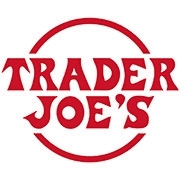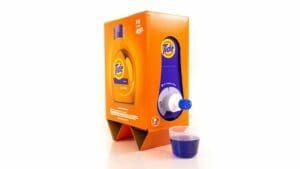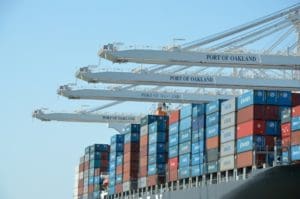It’s that time of year again – Super Bowl weekend. According to the National Retail Federation’s (NRF) annual Super Bowl survey, American adults say they will spend an average of $81.30 on the Super Bowl, for a total of $14.8 billion. The survey found that 72 percent of adults plan to watch the game, down from 76 percent last year. Among those watching, 79 percent plan to buy food and beverages, 10 percent will buy team apparel and accessories, 7 percent will buy decorations, 7 percent will buy new televisions, and 4 percent will buy furniture such as entertainment centers. This $14.8 billion does not take into account the amount of money that will be wagered in Vegas on the game, which saw nearly $160 million in action last year. The prop bets have become almost as fun as the game itself, especially as they span across multiple sports. For example, this year, you can bet on whether Tom Brady will have more attempts than James Harden has points against the Jazz that night. So the countdown for Super Bowl LIII is on; go Pats! And now on to this week’s news:
- FedEx adds late order, next-day delivery for retailers
- PostNL couriers to accept returns at the door
- China joins US, EU to negotiate cross-border e-commerce rules
- Descartes Systems Group to acquire Visual Compliance
- Arkansas judge rules truck drivers should be hourly, not by the mile
- Trader Joe’s to kill grocery delivery program
- USPS raises postage rates for 2019
 In order to grow their e-commerce business without a reliance on Amazon, FedEx is introducing a new late-night shipping option for retailers. Currently, Amazon only accounts for about 1.3 percent of FedEx’s revenue, and the company sees better growth in helping retailers compete against the e-commerce giant. The main driver is to meet the needs of retailers to quickly send orders to their online customers. The new program will enable retailers to deliver items the next day, even on orders placed as late as midnight. FedEx drivers will pick up packages as late as 2am and bring them to a sorting hub. From there, local market deliveries can happen as soon as that day, or within two days for other destinations in the US. FedEx tested the program in Los Angeles in 2017, and with its success, rolled it out to 100 markets. FedEx sees the delivery market expanding rapidly over the next five-plus years and will make this program available in more markets as a result.
In order to grow their e-commerce business without a reliance on Amazon, FedEx is introducing a new late-night shipping option for retailers. Currently, Amazon only accounts for about 1.3 percent of FedEx’s revenue, and the company sees better growth in helping retailers compete against the e-commerce giant. The main driver is to meet the needs of retailers to quickly send orders to their online customers. The new program will enable retailers to deliver items the next day, even on orders placed as late as midnight. FedEx drivers will pick up packages as late as 2am and bring them to a sorting hub. From there, local market deliveries can happen as soon as that day, or within two days for other destinations in the US. FedEx tested the program in Los Angeles in 2017, and with its success, rolled it out to 100 markets. FedEx sees the delivery market expanding rapidly over the next five-plus years and will make this program available in more markets as a result.
 I’ve written about the impact returns can have on the supply chain, and how these returns are handled in the evolving omni-channel environment. According to a lot of research I’ve done, e-commerce orders can often be returned to the store; PostNL is taking returns in a different direction. In order to boost customer convenience and sustainability, couriers from PostNL will now accept returns when making a standard delivery. Customers will be required to pack returns properly for pick-up, which includes printing out a return label and barcode from the retailer or PostNL’s website. The service is currently available in the Netherlands, and PostNL plans to roll the program out in Belgium and other markets soon.
I’ve written about the impact returns can have on the supply chain, and how these returns are handled in the evolving omni-channel environment. According to a lot of research I’ve done, e-commerce orders can often be returned to the store; PostNL is taking returns in a different direction. In order to boost customer convenience and sustainability, couriers from PostNL will now accept returns when making a standard delivery. Customers will be required to pack returns properly for pick-up, which includes printing out a return label and barcode from the retailer or PostNL’s website. The service is currently available in the Netherlands, and PostNL plans to roll the program out in Belgium and other markets soon.
 As e-commerce continues to grow, so too do the intricacies of cross-border e-commerce. This week, it was announced that China will join a group that includes the US, EU, and 47 other members of the World Trade Organization (WTO) in negotiating new rules to cover the $25 trillion (and growing) e-commerce market. According to a statement issued by the EU, the new rules will “seek to reduce barriers that prevent cross-border sales, ban duties on electronic transmissions, ensure the validity of e-contracts and e-signatures, and address forced data localization requirements.” The ongoing trade war has clearly made cross-border commerce a bit more difficult as a result of the heavily imposed tariffs and taxes. A formal agreement on the rules of cross-border e-commerce would be a big step forward. The group is expected to hold their first formal negotiating session in March.
As e-commerce continues to grow, so too do the intricacies of cross-border e-commerce. This week, it was announced that China will join a group that includes the US, EU, and 47 other members of the World Trade Organization (WTO) in negotiating new rules to cover the $25 trillion (and growing) e-commerce market. According to a statement issued by the EU, the new rules will “seek to reduce barriers that prevent cross-border sales, ban duties on electronic transmissions, ensure the validity of e-contracts and e-signatures, and address forced data localization requirements.” The ongoing trade war has clearly made cross-border commerce a bit more difficult as a result of the heavily imposed tariffs and taxes. A formal agreement on the rules of cross-border e-commerce would be a big step forward. The group is expected to hold their first formal negotiating session in March.
![]() Descartes Systems Group is continuing its trend of highly focused acquisitions. The company has announced that it will pay $250 million to acquire Visual Compliance, a vendor of software for denied party screening in global trade. Visual Compliance automates customs, trade, and fiscal compliance processes, with a focus on denied and restricted party screening processes and export licensing. Descartes has said that the acquisition will enhance its ability to provide data, content, and solutions to customers and partners to enable comprehensive global trade compliance reviews to be completed. Visual Compliance, a group of companies operating under the names “Visual Compliance,” “eCustoms” and “MSR” are all operated by Management Systems Resources Inc. and have annual revenues of $30 million.
Descartes Systems Group is continuing its trend of highly focused acquisitions. The company has announced that it will pay $250 million to acquire Visual Compliance, a vendor of software for denied party screening in global trade. Visual Compliance automates customs, trade, and fiscal compliance processes, with a focus on denied and restricted party screening processes and export licensing. Descartes has said that the acquisition will enhance its ability to provide data, content, and solutions to customers and partners to enable comprehensive global trade compliance reviews to be completed. Visual Compliance, a group of companies operating under the names “Visual Compliance,” “eCustoms” and “MSR” are all operated by Management Systems Resources Inc. and have annual revenues of $30 million.
The truck driving business is not an easy job. Drivers sometimes spend weeks on the road living out of their cabs. However, when it comes to work time, these drivers are legally capped at 70 hours over an 8-day period. Typically, drivers are paid by the mile, not the hour, which means they do not receive overtime, and laws governing work times can inhibit their ability to earn more money. Well, a federal judge in Arkansas has said that this violates the Fair Labor Standards Act. US District Judge Timothy Brooks reaffirmed that transportation companies violate federal labor laws when they don’t pay their truck-driver employees at least minimum wage for every non-sleeping hour spent in their truck. This is in response to a class-action lawsuit filed by 3,000 truck drivers against PAM Transport. This ruling could have serious implications on the entire trucking industry.
 I have written about the expansion of grocery delivery ad nauseum here; however, a major grocery retailer is moving in the opposite direction. Even though its major competitors are going all-in on grocery delivery, with expanded partnerships with crowd-sourced delivery companies, Trader Joe’s is killing grocery delivery in New York and will not roll it out in other markets. The grocery chain offered delivery in New York for 10 years but is killing the service due to rising costs. Trader Joe’s has always been about offering low cost options to its customers; the high cost of last mile deliveries was making this unsustainable, hence the decision to end the service.
I have written about the expansion of grocery delivery ad nauseum here; however, a major grocery retailer is moving in the opposite direction. Even though its major competitors are going all-in on grocery delivery, with expanded partnerships with crowd-sourced delivery companies, Trader Joe’s is killing grocery delivery in New York and will not roll it out in other markets. The grocery chain offered delivery in New York for 10 years but is killing the service due to rising costs. Trader Joe’s has always been about offering low cost options to its customers; the high cost of last mile deliveries was making this unsustainable, hence the decision to end the service.
And finally, the USPS has announced new postage rates for 2019. Effective earlier this week, the cost of sending a normal-sized one-ounce letter with a Forever stamp is now 55 cents, up from 50 cents. And a small flat rate box will now cost $7.90, up from $7.20, with other Priority and flat rates going up accordingly. Certified mail now costs $3.50 per piece, up from $3.45. These price increases are the largest single-year jump the agency has ever made. However, it should all be taken with a grain of salt, as the USPS has one of the lowest letter rates in the industrialized world.
That’s all for this week. Enjoy the weekend, the Super Bowl, and the song of the week, Time to Confess by Gov’t Mule.
















































